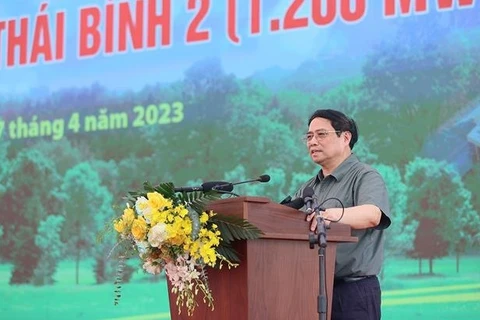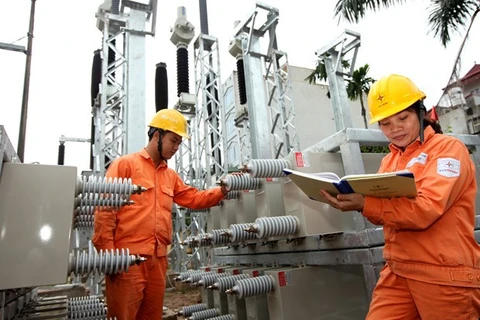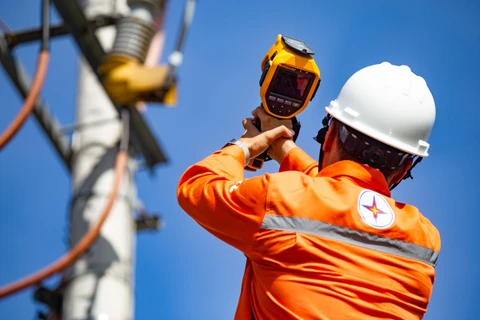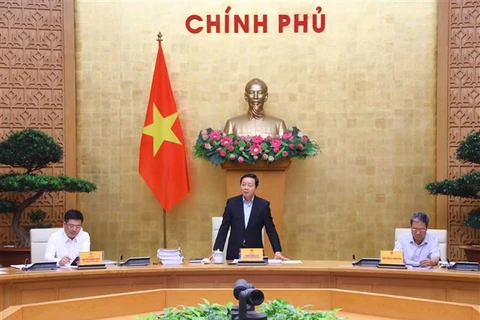Hanoi (VNA) – The northern region is facing a high risk of serious electricity shortage this summer due to rising demands and low output of hydropower plants as a result of unfavourable weather conditions, according to the Vietnam Electricity (EVN).
In a report to the Ministry of Industry and Trade, the EVN underlined that the water level of reservoirs in the northern region in the first four months of this year was equivalent to 70-90% of the average in many years. Similar situation was also seen in many other reservoirs in the central and southern region.
As of April 24, the water level had been low enough to pose a risk of affecting power security and electricity supply for daily activities in the rest of this year’s dry season. As a result, the remaining capacity of producing electricity of reservoirs in the whole system is 4.5 billion kWh, 1.6 billion kWh lower than the plan, and 4.1 billion kWh lower than the same period in 2022.
According to the National Centre for Hydrometeorological Forecasting, the El Nino phenomenon will occur in the last months of 2023, causing the temperature to rise and the rainfall to be lower than the average of many years. This is likely to make the flow to the lakes in the last months of the year to decrease.
Meanwhile, the supply of fuel for coal and gas power plants is also limited due to low production and exploitation. EVN-managed plants will face a shortage of 1.3 million tonnes of coal.
Production from renewable energy sources such as wind power in May, June, and July are also forecast to be lower than 2022.
The EVN held that in the event of extreme situations such as a year-on-year rise of 15% in power consumption in the north due to hot weather, power system incidents and a sharp fall in the water level of large hydropower reservoirs, the northern region may face a power shortage of up to 1,600- 4,900 MW in May and June.
To prevent the situation, the EVN will optimise hydroelectric power sources in the north, while increasing power transmission from the central region to the north and regulating water sources to ensure operations of hydropower projects.
At the same time, it will also intensify inspections to minimise incidents, and speed up the negotiations for electricity purchase from renewable energy projects.
The EVN also underlined that saving electricity and using electricity efficiently is a very important solution to ensure enough electricity during the hot period./.
In a report to the Ministry of Industry and Trade, the EVN underlined that the water level of reservoirs in the northern region in the first four months of this year was equivalent to 70-90% of the average in many years. Similar situation was also seen in many other reservoirs in the central and southern region.
As of April 24, the water level had been low enough to pose a risk of affecting power security and electricity supply for daily activities in the rest of this year’s dry season. As a result, the remaining capacity of producing electricity of reservoirs in the whole system is 4.5 billion kWh, 1.6 billion kWh lower than the plan, and 4.1 billion kWh lower than the same period in 2022.
According to the National Centre for Hydrometeorological Forecasting, the El Nino phenomenon will occur in the last months of 2023, causing the temperature to rise and the rainfall to be lower than the average of many years. This is likely to make the flow to the lakes in the last months of the year to decrease.
Meanwhile, the supply of fuel for coal and gas power plants is also limited due to low production and exploitation. EVN-managed plants will face a shortage of 1.3 million tonnes of coal.
Production from renewable energy sources such as wind power in May, June, and July are also forecast to be lower than 2022.
The EVN held that in the event of extreme situations such as a year-on-year rise of 15% in power consumption in the north due to hot weather, power system incidents and a sharp fall in the water level of large hydropower reservoirs, the northern region may face a power shortage of up to 1,600- 4,900 MW in May and June.
To prevent the situation, the EVN will optimise hydroelectric power sources in the north, while increasing power transmission from the central region to the north and regulating water sources to ensure operations of hydropower projects.
At the same time, it will also intensify inspections to minimise incidents, and speed up the negotiations for electricity purchase from renewable energy projects.
The EVN also underlined that saving electricity and using electricity efficiently is a very important solution to ensure enough electricity during the hot period./.
VNA

























